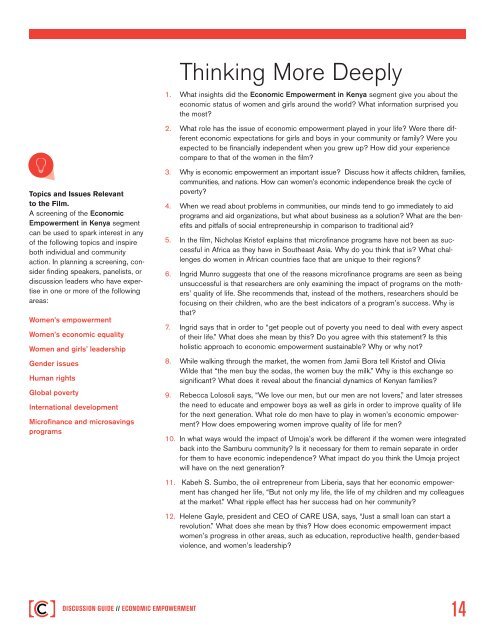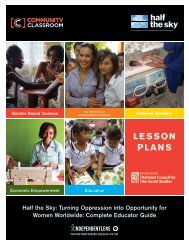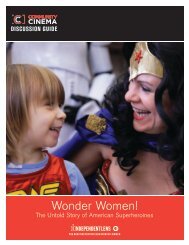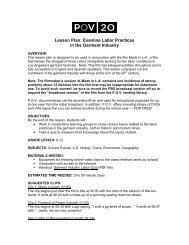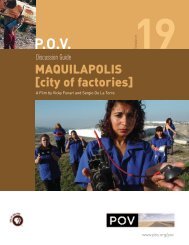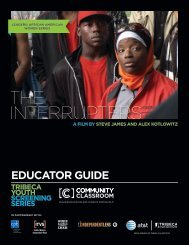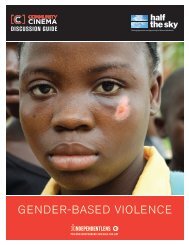economic empowerment - PBS
economic empowerment - PBS
economic empowerment - PBS
- No tags were found...
Create successful ePaper yourself
Turn your PDF publications into a flip-book with our unique Google optimized e-Paper software.
Topics and Issues Relevantto the Film.A screening of the EconomicEmpowerment in Kenya segmentcan be used to spark interest in anyof the following topics and inspireboth individual and communityaction. In planning a screening, considerfinding speakers, panelists, ordiscussion leaders who have expertisein one or more of the followingareas:Women’s <strong>empowerment</strong>Women’s <strong>economic</strong> equalityWomen and girls’ leadershipGender issuesHuman rightsGlobal povertyInternational developmentMicrofinance and microsavingsprogramsThinking More Deeply1. What insights did the Economic Empowerment in Kenya segment give you about the<strong>economic</strong> status of women and girls around the world? What information surprised youthe most?2. What role has the issue of <strong>economic</strong> <strong>empowerment</strong> played in your life? Were there different<strong>economic</strong> expectations for girls and boys in your community or family? Were youexpected to be financially independent when you grew up? How did your experiencecompare to that of the women in the film?3. Why is <strong>economic</strong> <strong>empowerment</strong> an important issue? Discuss how it affects children, families,communities, and nations. How can women’s <strong>economic</strong> independence break the cycle ofpoverty?4. When we read about problems in communities, our minds tend to go immediately to aidprograms and aid organizations, but what about business as a solution? What are the benefitsand pitfalls of social entrepreneurship in comparison to traditional aid?5. In the film, Nicholas Kristof explains that microfinance programs have not been as successfulin Africa as they have in Southeast Asia. Why do you think that is? What challengesdo women in African countries face that are unique to their regions?6. Ingrid Munro suggests that one of the reasons microfinance programs are seen as beingunsuccessful is that researchers are only examining the impact of programs on the mothers’quality of life. She recommends that, instead of the mothers, researchers should befocusing on their children, who are the best indicators of a program’s success. Why isthat?7. Ingrid says that in order to “get people out of poverty you need to deal with every aspectof their life.” What does she mean by this? Do you agree with this statement? Is thisholistic approach to <strong>economic</strong> <strong>empowerment</strong> sustainable? Why or why not?8. While walking through the market, the women from Jamii Bora tell Kristof and OliviaWilde that “the men buy the sodas, the women buy the milk.” Why is this exchange sosignificant? What does it reveal about the financial dynamics of Kenyan families?9. Rebecca Lolosoli says, “We love our men, but our men are not lovers,” and later stressesthe need to educate and empower boys as well as girls in order to improve quality of lifefor the next generation. What role do men have to play in women’s <strong>economic</strong> <strong>empowerment</strong>?How does empowering women improve quality of life for men?10. In what ways would the impact of Umoja’s work be different if the women were integratedback into the Samburu community? Is it necessary for them to remain separate in orderfor them to have <strong>economic</strong> independence? What impact do you think the Umoja projectwill have on the next generation?11. Kabeh S. Sumbo, the oil entrepreneur from Liberia, says that her <strong>economic</strong> <strong>empowerment</strong>has changed her life, “But not only my life, the life of my children and my colleaguesat the market.” What ripple effect has her success had on her community?12. Helene Gayle, president and CEO of CARE USA, says, “Just a small loan can start arevolution.” What does she mean by this? How does <strong>economic</strong> <strong>empowerment</strong> impactwomen’s progress in other areas, such as education, reproductive health, gender-basedviolence, and women’s leadership?Discussion guide // <strong>economic</strong> <strong>empowerment</strong>14


